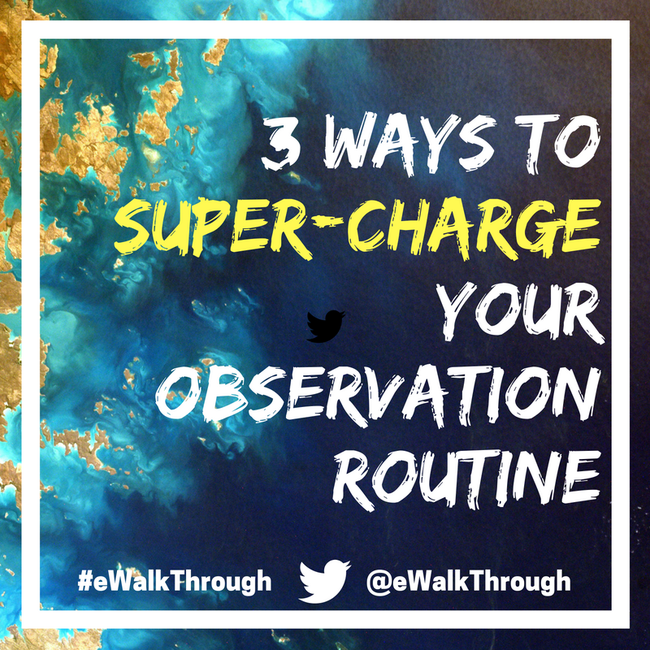|
Does this describe your work and your life at this moment?
Try these strategies to super-charge your observation routine. Commit, stay on track, and you'll head into 2017 with completed observations on all your teachers and observation goals met--maybe even exceeded! #1 - Get tethered to your tablet! It's that simple. Remember, you can conduct walkthroughs on your tablet or phone. Carry it with you--always. No excuses. You will be amazed at how frequently a convenient opportunity will arise to take 3 minutes--just 3 minutes--and complete an observation. You've probably been observing teachers anyway, just NOT within your digital eWalkThrough® or classroom observation system. So carry your phone and get logged on! By the end of the week, your observation numbers will increase dramatically. Get tethered to your tablet! Your stress level will go down. Teachers will receive the feedback they crave. #2 - Trust your instincts! It’s easy to avoid conducting observations because you think it’s important to have a set schedule, to go in at just the right time, and to attempt to observe all the look-fors on the tool face. Make an about-face! You are an experienced instructional leader. The best walkthroughs are unplanned. Research indicates that it is very unlikely an observer will see each and every look-for during each and every observation. So enjoy! Step in classrooms unannounced. Don’t second guess what you see. Open the door. Walk in. Mark your responses on your digital tool. Don’t debate and don’t hesitate. Hit ‘submit!’ It’s done! The data you generate are invaluable. Teachers can reflect. Coaching and mentoring self-generates. The data inform the design of differentiated professional learning! That’s what you want. Support teachers. Give teachers exactly what they need. The answers are in the data. Trust your instincts. #3 - Talk about the data! That’s right! One of the best ways to super-charge your observation routine is to use the data. Talk about it! Talk to your teachers individually. Send reports to professional learning communities and grade levels teams. Share building data at faculty meetings. Provide powerful aggregate data analysis to the board of education, to advisory boards, to the parent organization in your school/district, and other stakeholders. When you talk about the data, everyone naturally wants to know more. This motivates more observation. When you’re motivated, the process becomes exciting. The more you observe, the easier it is. Before you know it, observation is a habit. It’s a routine. Talk about the data. The result? Instruction will improve. Student achievement will increase. Everybody wins!
0 Comments
|
Kelly GillespieKelly's insights on classroom observation, education, leadership, teaching, and mentoring. Archives
July 2018
Categories
All
|

 RSS Feed
RSS Feed
